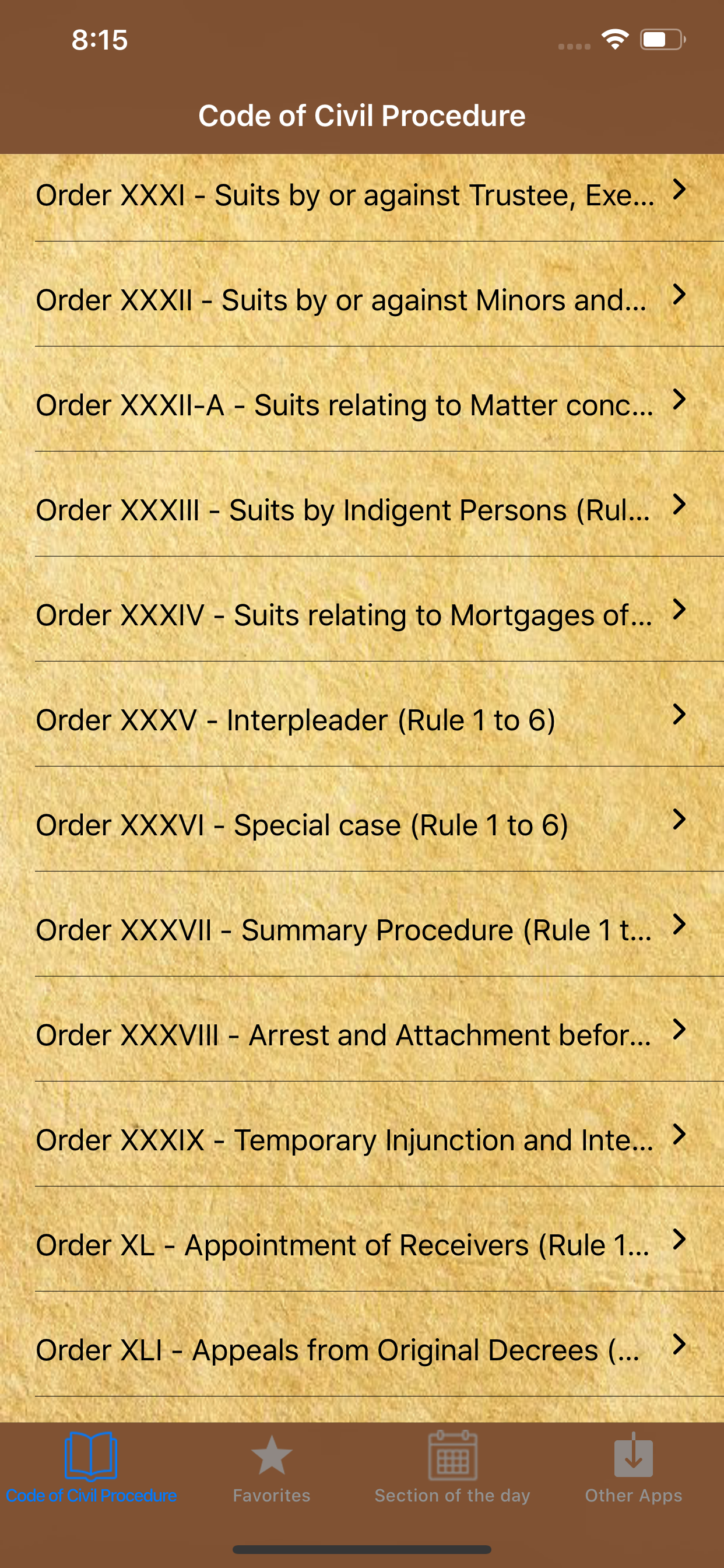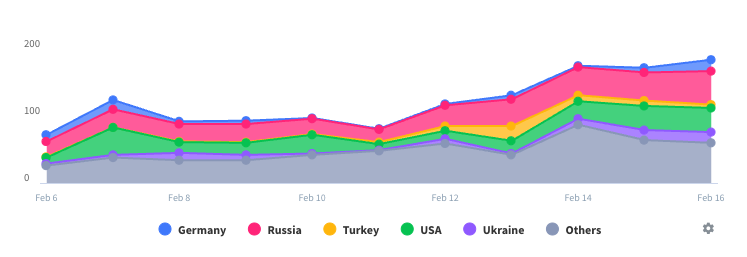
Description
The Code of Civil Procedure, 1908 is a procedural law related to the administration of civil proceedings in India.
The Code is divided into two parts: the first part contains 158 sections and the second part contains the First Schedule, which has 51 Orders and Rules. The sections provide provisions related to general principles of jurisdiction whereas the Orders and Rules prescribe procedures and method that govern civil proceedings in India.
To give uniformity to Civil Procedure, Legislative Council of India, enacted Code of Civil Procedure, 1858, which received the assent of Governor-General on 23 March 1859. The Code however, not applicable to Supreme Court in the Presidency Towns and to the Presidency Small Cause Courts. But it did not meet the challenges and was replaced by Code of Civil Procedure Code, 1877. But still it did not fulfil the requirements of time and large amendments were introduced. In 1882, the Code of Civil Procedure, 1882 was introduced. With passing of time it is felt that the Code needs some flexibility to breathe the air of speed and effectiveness. To meet these problems Code of Civil Procedure, 1908 was enacted. Though it has been amended number of time it stood the test of time
Complete CPC - Code of Civil Procedure presented in a user friendly design with excellent user experience. Divided clearly into Chapters and Sections and unedited text of all Rules/Sections and Orders. Browse through sections with swipe gesture in a clutter free design helping you focus on the core content. THIS APP WORKS IN OFFLINE MODE
Really helpful for Law students doing LLB, Lawyers, Advocates and equally important for citizens of India in understanding Indian Law and be more comfortable with the legal terminology.
One app focused on giving an excellent user experience while studying and getting to know Indian Law. We promise the best of the technology with much more to come in coming updates.
- A real readable format for better readability.
- All Rules and Sections divided into chapters and sections.
- Browse through entire content in a structured manner.
- Fast, Intuitive Full Text Search to allow search chapters/ Sections and content.
- Add sections to favorites for future reference.
- Share app across all possible shareable options available on your device.
- Neat Presentation in the form of Heading and Description in every Screen
- Clean Reading Experience
- Memory and Batter efficient experience.
- WORKS OFFLINE
- A good way to learn about the CPC
And MUCH MUCH more!
Hide
Show More...
The Code is divided into two parts: the first part contains 158 sections and the second part contains the First Schedule, which has 51 Orders and Rules. The sections provide provisions related to general principles of jurisdiction whereas the Orders and Rules prescribe procedures and method that govern civil proceedings in India.
To give uniformity to Civil Procedure, Legislative Council of India, enacted Code of Civil Procedure, 1858, which received the assent of Governor-General on 23 March 1859. The Code however, not applicable to Supreme Court in the Presidency Towns and to the Presidency Small Cause Courts. But it did not meet the challenges and was replaced by Code of Civil Procedure Code, 1877. But still it did not fulfil the requirements of time and large amendments were introduced. In 1882, the Code of Civil Procedure, 1882 was introduced. With passing of time it is felt that the Code needs some flexibility to breathe the air of speed and effectiveness. To meet these problems Code of Civil Procedure, 1908 was enacted. Though it has been amended number of time it stood the test of time
Complete CPC - Code of Civil Procedure presented in a user friendly design with excellent user experience. Divided clearly into Chapters and Sections and unedited text of all Rules/Sections and Orders. Browse through sections with swipe gesture in a clutter free design helping you focus on the core content. THIS APP WORKS IN OFFLINE MODE
Really helpful for Law students doing LLB, Lawyers, Advocates and equally important for citizens of India in understanding Indian Law and be more comfortable with the legal terminology.
One app focused on giving an excellent user experience while studying and getting to know Indian Law. We promise the best of the technology with much more to come in coming updates.
- A real readable format for better readability.
- All Rules and Sections divided into chapters and sections.
- Browse through entire content in a structured manner.
- Fast, Intuitive Full Text Search to allow search chapters/ Sections and content.
- Add sections to favorites for future reference.
- Share app across all possible shareable options available on your device.
- Neat Presentation in the form of Heading and Description in every Screen
- Clean Reading Experience
- Memory and Batter efficient experience.
- WORKS OFFLINE
- A good way to learn about the CPC
And MUCH MUCH more!
Screenshots
CPC 1908 Civil Procedure Code FAQ
-
Is CPC 1908 Civil Procedure Code free?
Yes, CPC 1908 Civil Procedure Code is completely free and it doesn't have any in-app purchases or subscriptions.
-
Is CPC 1908 Civil Procedure Code legit?
Not enough reviews to make a reliable assessment. The app needs more user feedback.
Thanks for the vote -
How much does CPC 1908 Civil Procedure Code cost?
CPC 1908 Civil Procedure Code is free.
-
What is CPC 1908 Civil Procedure Code revenue?
To get estimated revenue of CPC 1908 Civil Procedure Code app and other AppStore insights you can sign up to AppTail Mobile Analytics Platform.

User Rating
App is not rated in Switzerland yet.

Ratings History
CPC 1908 Civil Procedure Code Reviews
Store Rankings

Ranking History
App Ranking History not available yet

Category Rankings
|
Chart
|
Category
|
Rank
|
|---|---|---|
|
Top Free
|

|
374
|
CPC 1908 Civil Procedure Code Installs
Last 30 daysCPC 1908 Civil Procedure Code Revenue
Last 30 daysCPC 1908 Civil Procedure Code Revenue and Downloads
Gain valuable insights into CPC 1908 Civil Procedure Code performance with our analytics.
Sign up now to access downloads, revenue, and more.
Sign up now to access downloads, revenue, and more.
App Info
- Category
- Books
- Publisher
-
Mohit Agarwal
- Languages
- English
- Recent release
- 1.3.0 (1 year ago )
- Released on
- Dec 26, 2019 (5 years ago )
- Also available in
- India , Pakistan , United States , Saudi Arabia , Australia , Malaysia , Singapore , South Korea , Japan , Kuwait , Vietnam , Kazakhstan , Lebanon , Madagascar , Mexico , United Arab Emirates , Nigeria , Netherlands , Norway , New Zealand , Peru , Philippines , South Africa , Poland , Portugal , Romania , Russia , Sweden , Thailand , Türkiye , Taiwan , Dominican Republic , Argentina , Austria , Azerbaijan , Belgium , Brazil , Belarus , Canada , Switzerland , Chile , China , Colombia , Czechia , Germany , Denmark , Italy , Algeria , Ecuador , Egypt , Spain , Finland , France , United Kingdom , Greece , Hong Kong SAR China , Hungary , Indonesia , Ireland , Israel
- Last Updated
- 1 week ago
This page includes copyrighted content from third parties, shared solely for commentary and research in accordance with fair use under applicable copyright laws. All trademarks, including product, service, and company names or logos, remain the property of their respective owners. Their use here falls under nominative fair use as outlined by trademark laws and does not suggest any affiliation with or endorsement by the trademark holders.







